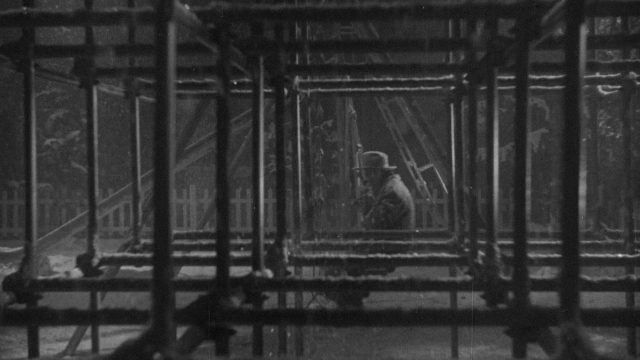When people discuss Akira Kurosawa, the first movie to come up is Seven Samurai. Maybe Ran or Rashomon. IMDb suggests that I might also know him from Kagemusha or The Hidden Fortress. Others may be upset if I don’t mention Yojimbo or Sanjuro. And don’t get me wrong—all of those are fine movies. I’m not the world’s biggest Hidden Fortress fan, true, but you can’t argue with “and then it was Star Wars.” Still, what all those films have in common is that they are period pieces. I’m a big fan of period pieces, but I don’t think they’re his best work. If I’m going to sit down and watch Kurosawa, it’ll be his works set in contemporary Japan more often than not.
From his earliest days as a director, Kurosawa alternated contemporary films and period pieces, and from those days, it was the period pieces that drew more attention. He was even essentially forced to do a sequel to his first one. However, the first movie that was something critics noticed was Drunken Angel, the story of an alcoholic doctor who tries to cure a yakuza of tuberculosis. Despite the post-war censorship of the American occupation, Kurosawa still managed to create a story that explored the frustration and despair of a conquered people.
Kurosawa was an early pioneer of Japanese detective movies with Stray Dog, which has lingering influence in the procedural genre. High and Low was an adaptation of an Ed McBain novel that, in my opinion at least, far surpassed the original book in quality. He transferred the action to Japan, of course, but he also gave the source material some cultural twists based on, again, the influence the war had on Japanese culture. It gives characters’ actions greater depth to think about the story in the context of the complete change in their society not that long before the story takes place.
However, his greatest triumph would come with Ikiru. It is the story of Kanji Watanabe (Takashi Shimura, one of the many actors who repeatedly worked with Kurosawa), a minor bureaucrat who is told he merely has gastritis, but he has been told that the particular list of things the doctors say to him will prove he has stomach cancer. (It was incurable at the time, and it was believed that giving patients a death sentence was bad for them.) Because he is dying, he decides he needs to live. In the end, the best way to live is to do good for others, who will themselves live on.
Don’t get me wrong; I love Seven Samurai. It’s a powerful film. Ran is a great blending of the plot of Shakespeare and Japanese history. It’s also pure spectacle. (This is not, to me, an insult!) Throne of Blood ditto. And maybe I Live in Fear is less, well, spectacular. However, it—like many of the contemporary films he made—gets deeper into the personality of its characters. No surprise he worked with Ishiro Honda; it, like Godzilla, is a way of dealing with Japan’s nuclear fears. Of course, it’s also less spectacular than Godzilla.
The contemporary films of Akira Kurosawa are a picture of a society. They are a way of dealing with a nation that had gone through a lot. Oh, that’s because of the actions of Japanese leadership, for the most part, but still. Kurosawa had spent the war in the propaganda department—he met his wife making a movie about female factory workers—and that may well have been what gave him such a clear perspective on the issues of the Japanese people. Likewise when his older brother took him to see the aftermath of the Great Kanto earthquake when he was an adolescent. Or maybe it was just in his nature. It’s hard to say at this late date.
However it happened, it remains my firm opinion that the contemporary films of Akira Kurosawa deserve more attention than the period dramas. This isn’t to say that the period dramas aren’t amazing and don’t deserve attention. There are very few films of any kind that don’t deserve attention—I’m given to understand that required sequel isn’t terribly good, though I haven’t seen it. Still, if there’s a director who better understood the post-war mood in any country, I haven’t encountered their work.
Help me afford more of his movies by supporting my Patreon or Ko-fi!


